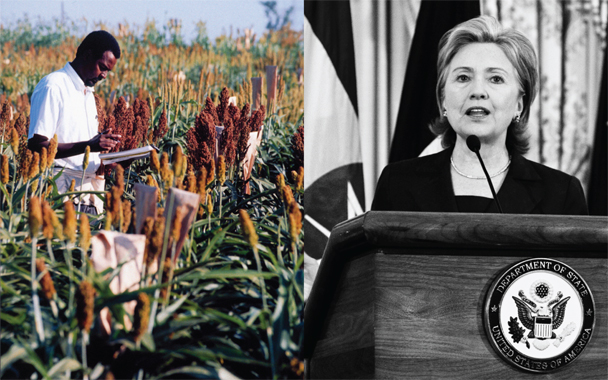With her much-touted White House garden and repeated references to steamed broccoli, Michelle Obama has very publicly set out to change the way America eats. But when it comes to national food policy, it may be a former first lady whose impact proves more profound in the long run. Earlier this month, Secretary of State Hillary Clinton used the announcement of this year’s World Food Prize winner to herald the administration’s new foreign policy approach to tackling global hunger. “The issue of chronic hunger and food security is at the top of the agenda,” Clinton told the crowd of some 500 who had gathered in the regal Benjamin Franklin Room at the U.S. State Department on June 11. “For too long,” she continued, “our primary response has been to send emergency aid when the crisis is at its worst. This saves lives, but it doesn’t address hunger’s root causes.”
Clinton’s speech and the awarding of the $250,000 prize to Gebisa Ejeta, an Ethiopian plant breeder and Purdue professor whose development of drought-and weed-resistant sorghum has had a dramatic effect on Sudan and other Horn of Africa countries, came on the heels of the announcement by President Obama, at the April G-20 meeting in London, that he intends to double assistance for global agricultural and rural development.
It’s about time. Though food riots may no longer be making headlines, the situation worldwide has actually gotten much worse. On June 19, the United Nations Food and Agriculture Organization said the number of the world’s hungry had reached a record one billion (100 million more than just a year ago), and trends in population growth, agricultural productivity, energy prices, water scarcity, and climate change suggest things won’t improve any time soon.
“Hungry people are desperate people,” Indiana Senator Richard Lugar said in response to Obama’s G-20 announcement, “and their desperation can have destabilizing effects on the global economy and national governments.” Along with Pennsylvania senator Bob Casey, Lugar is cosponsor of The Global Food Security Act of 2009, which, among other provisions, calls for the appointment of a National Security Council–based “Special Coordinator for Food Security,” or food czar, to implement a comprehensive food security strategy. The act, which was approved by the Senate Foreign Relations Committee in late March, is currently making its way through Congress.
In the current issue of Foreign Affairs, Catherine Bertini and Dan Glickman continue Lugar’s theme, citing evidence that Islamic fundamentalists in Afghanistan and Pakistan are using free food to lure hungry students into madrassas “that preach hate and extremism,” and that the Taliban are having recruitment success in areas of Afghanistan where agriculture is failing. Bertini, who served as executive director of the World Food Program from 1992 to 2002, and Glickman, the Secretary of Agriculture from 1995 to 2001, cochaired the Gates Foundation–funded Chicago Council on Global Affairs’ Global Agricultural Development Project, on which their essay is based.
Despite the link between food security and national security, official U.S. policy over the last few decades has been to basically ignore global agriculture. Between 1980 and 2003, for example, total U.S. aid to developing countries for agricultural research fell by 64 percent—from $5.3 billion to $1.9 billion in 1999 dollars—and U.S. aid to agriculture in Africa has dropped 85 percent since the 1980s.
Making foreign aid to the hungry and poor a central part of the National Security Council’s mandate, Bertini and Glickman argue, makes perfect sense for an administration “that recognizes the limits of force in global politics.” The two call on Congress to pass the Lugar-Casey Act and recommend that State Department and USAID staffers become more actively engaged in agricultural policy. They also advocate a scaling-back of the Bumpers Amendment, which bars the use of funding to help developing countries produce crops that might compete with American farmers, and call for the re-establishment of the House Select Committee on Hunger, which was disbanded in 1993. And they reiterate what many have long said: that more food aid should come from the fields of the needy countries themselves, and that the domestic subsidies that skew the global market to begin with should get a major overhaul. Finally, Bertini and Glickman say, the gender focus needs to shift. As Clinton herself told the crowd at the State Department, “Seventy percent of the world’s farmers are women, but most programs that offer farmers credit and training target men. This is both unfair and impractical.”
Though the Lugar-Casey Act isn’t perfect (the Oakland-based Food First has denounced its “industry-dominated agenda”), you have to applaud its renewed focus on issues of food security. “For us,” Clinton said on behalf of the new administration, “sustainable agriculture won’t be a side project. It is a central element of our foreign policy.”
Winning hearts and minds with beans and rice? I’d call that a welcome departure from shock and awe.

